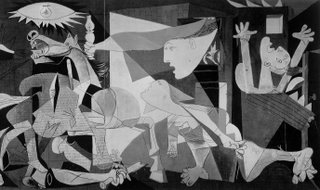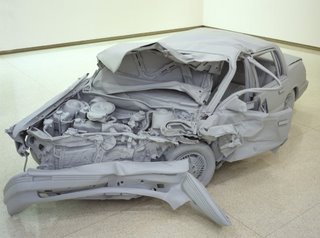Perception and Politics, Empricism and Art

Oh, no! Another picture of Guernica!
An interesting non-argument was happening over on Edward Winkleman about Frank Furedi the nature of politics and art, and this is to perhaps overstate the case, but it sounds overly binary over there... either you are making political art, or you are making fluffy crap that only serves the purpose of pandering to the elite Chelsea Machine.
And don't get me wrong, I see the reason behind this drive to want political art. The number one subject matter rolling through Chelsea is still a listless longing for each individual artist's teenage years, and that, when you look at what is going on in the world around you, is so head-in-the-sand, so not-getting-it, that it's embarassing. Sometimes I do wonder if artists are blind, and I wonder why I make art, and I wonder whether there is a social role for artists that makes more sense...
(sincerest apologies to Ashes, HLIB, Art Powerlines for dragging them into my argument with Eric Larsen about this by taking their thoughts about this out of context)
...And we know that Larsen is totally opposed to this idea, and he has a really cogent argument about why that is morally decent and logically true. To make political art that takes a side is to decide what good is for others, and in a "free democracy" this should be a matter of individual, empirical decision-making, an act of group participation, not a matter of indoctrination. To make political art is to decide what is "good" for other people, and that is tricky business because what "good" means shifts radically from culture to culture. The Greeks thought slavery was good, Kat pointed out to me yesterday. And we live in a culture that uses the Greek Model for many things, including our (ailing) democracy, and yet we are capable of understanding that people who are not landowners should have a vote, for example, or that slavery is not good.
We have made these distinctions based on empirical evidence--we can perceive and therefore test our assumption that non-landowners use governmental services and can therefore logically deduce that these citizens should be active in governmental decision-making.
So what is a moral creature who can't handle this culture of "truthiness", the coup of 2000, our unelected government, denial of empiricical evidence of climate change, shameless pandering to corporate interests and the total disappearance of the middle class to do? While I buy Larsen's assertion that to politicize art is to flatten it, and while the last thing I want to do is to join the idiocy and tell people what "good" is, I cannot stand here in my art tower and passively watch.
Larsen believes that there is no such thing as a social role for the artist as such--that the artist is no different from any citizen. And I think this conclusion is precious and backward-looking, that it is based on a firm wish that this would all just go away. I think there is something specific about being an artist that can be extremely helpful right now, and it has nothing to do with collapsing into political art, which is part of the problem, no matter how well-intended it might be. Larsen wants things to be as they were, and this is impossible.
I had a really good conversation with an artist who's working at Socrates yesterday. And yeah, I promised that I would never write about the park, but this isn't about the park. We were talking about the state of the world and what could be done about it.

Charles Ray, Unpainted Sculpture
See, artists are still trained to perceive the world around them and solve problems. Less and less, sure, but you can be hot right now and be engaged in a perception project, like Charles Ray or Jennifer Pastor or this park artist, who I will name if he says it's cool. Or a makerthinker project. Or some other kind of empirically-based inquiry of the world around you that depends on figuring out how materials actually behave, what the world really looks like, what it really feels like to see the world, that membrane between raw data and what gets perceived by the mind, what it means. And this work can be as overtly political as Jon Kessler's Palace at 4am or as absurd as Charles Ray's Family or as physical as Streb. This dependence on probing the world empirically is still happening, even in a world of Frank. Let's cling to this truth!

Jon Kessler, Palace at 4am
Stay tuned for a thorough treatment of why this sustained looking, this refusal to be soothed, this looking past and understanding of Larsen's media aesthetic, this continual need to dream by solving problems is the most powerful political act one can be engaged in, and why I think there is a specific social role for the artist as empiricist, as perceiver, as makerthinker. It doesn't mean campaigning in the streets, or painting kid's faces, or even Art Powerlines' Art For The People. It's not Marxist, it doesn't require a revolution. It just requires making some good fucking art and being a part of a community that is willing to tell one another the truth about the empirical, perceptual importance and impact of work. That community can push out a whole culture of looking, a whole culture of problem-solving that does more than look backwards and long for what it was.
This kind of artmaking is elitist. It's more important than popular culture. It takes more time and you get more out of it, and that's okay. In fact, it's critical.
The most political thing an artist can do right now is create something that requires, elicits and rewards sustained viewing, that celebrates problem solving. This is true because the only things to do to a culture of lies are to find and expand what is not a lie, and examine and understand the lies thoroughly.

10 Comments:
...either you are making political art, or you are making fluffy crap that only serves the purpose of pandering to the elite Chelsea Machine...
I didn't think the discussion was about that at all (then again, it did become quite convoluted). What I was trying to demonstrate to edward was that all art is political (especially fluffy crap). But I was so unsuccessful that I couldn't even get him to see that Guernica was made with a political purpose.
To make political art that takes a side is to decide what good is for others,
At the very least, even artworks that are just 'presenting' observations are essentially saying "Look at this! It's important!" By highlighting one thing and ignoring another, every work of art is making a judgment of value -- judgments that have moral and political implications.
This kind of artmaking is elitist. It's more important than popular culture. It takes more time and you get more out of it, and that's okay. In fact, it's critical.
Here's an example from non-elitist popular culture that is already somewhat fulfilling your call for "sustained looking," a "refusal to be soothed," this "looking past."
You may find some interest in the site of artist Beverly Naidus. Be sure to check out her article about interdisciplinary art, her section of favorite links, and some examples of her work.
What are your thoughts on the methods of Tactical Media, particularly as exemplified by CAE?
I'm just reaching the second essay :(
I'm plodding with alien intellence though. Some great observations as usual
Political art is only good when it has something individual to say. Too often I see pieces that are derivative or that make me say, "Yeah, I saw the same news footage as the artist." Show me something I couldn't think of myself. (BTW, That's my rule for both political and non-political art.)
a very nice job Fisher, and I didn't think any apology was necessary. I don't think I am contradicting what you say by reminding that history is loaded with tons of good, hard-hitting political art. And it starts before Goya certainly, but continuing through the 1960 and 1970s when I think about all that what happened I still have to say "WTF?" I haven't and probly won't read Larsens book so I am not commenting on his opinion, but it seems like a lot of people got convinced that some how the left LOST the sixties. That is as profound a piece of artless right wing propaganda as I can think of, patently false as their many stolen elections only prove further.
The situation we're in now is supposedly a-political because of a forced cultural collapse that the right wing insists on, it is their ideology that eliminates politics from the discussion because they are right about everything so no further discussion is necessary. Personally, I couldn't make an ideologically coherent artistic statement if I tried, and that's I think because my politics are humanist first. And I won't read Larsens book for the reasons that Hunter (above me here) spells out quite nicely. But I consider all the teenage navel gazing that you decry is political in the sense that these people are paying attention to themselves, putting their houses in order (doubtfully but hopefully), and not merely swinging from ideological ropes the way that people, artists, activists, did in the past. But then again lots of them didn't. I think of Yoko Ono being supremely political. Sharing you're dismay, I believe fault lies more with corporate funded curation and curatorial studies that have descended to the bowels of inanity rather than with artists themselves.
sorry, i hoped only to clarify that I am not really refering to his book. With respect to everything I've seen written about it over the last few weeks, it doesn't strike me that I necessarily disagree with or feel negatively about that for which he argues. I do wonder if it would make me think of something I hadn't thought, my point in referring to Hunter's comment. Actually - just as an aside, i have a similar problem with Berman's last two books (this latest I probly won't even read) but compared to the Conciousness series, are dead depressing. I'll be watching with interest for what you think of Reenchantment.
Hey Ashes,
Yeah, the thing that I find interesting (and true) about Larsen's thesis is that it's not a right wing problem. He faults the left and the right equally. No, I think he would say that the right and left wing idiocies are spawn of the same demon.
as said,
All art is politically important because it's a commodity, but why does it follow that all art, then, should be political in its motivation? How does this justify artists who tell others what good is and what it means based on abstractions? How does the political importance of art as a commodity justify artists who substitute abstractions based on identity politics for empirical observations and perceptions about individual lives?
There is a real tyrrany in this kind of flattening of experience into abstractions like race and gender and sexuality, and it is propagandizing for artists to use these abstractions to tell us what is "good", in the absence of any empirical data.
I haven't seen Beverly Nadius' work in person and don't think it's fair to be a jpeg critic. But since it's got a lot of text, I can say that the text of the pieces is propagandizing. It is telling the viewer what good is based on abstract ideas about identity (ethnicity, class and gender), and I find that problematic. I think the text speaks in code, and that I am already supposed to know what to think about it--it is not individually meaningful or thought provoking. It is quite unspecific, there is little observation of life happening in it.
I don't get anything from the text that I am not already supposed to know. I think that this kind of thinking in abstractions and not in terms of individual experience is part of the problem and not a part of the solution.
here here, and good reply. I can't say I know much of Nadius' work either. A glance at the web-site makes me wary, but that said... I will probably go onto a limb and say that it's a matter of distance, see my just now silly post on Und du ? Some questions are easy and some are not and I definitely don't like the easy one's answered for me.
I don't think all art is political in its motivation, I think all art is political by virtue of its realization. I don't think anything will justify artists who tell others what good is and what it means based on abstractions. I think good art convinces one of it's inherent goodness and that is political. That is what makes the issue of "abstraction," invented by Bolsheviks and Jews then commandeered by the CIA and the corporations soooo interesting. What is not interesting is the Today Show trying to be neutral and all things to all people. That is really political and in the worst way. I think the left just leaves itself open to criticism about its propagandizing because we're lousey at it. Now the Today Show ? that is so slick people think it is a-political.
not sure about that last one, I am not sure commodity-value is related to the political value, though the "commodification" of anything obviously has politcal ramifications. I think art is both commodified and un-commodifiable (priceless sometimes). I agree with you on the tyranny bit, but what I started to write up there is that it is just a matter of historical distance. Give your self 40 years and you will long for one of those acne-trauma paintings. (They'll probly all be gone.) ja ja
I put this on your "makerthinker" link but wondered if anybody'd see it. So can I put it here, too?
Hello, Deborah Fisher. Been reading your latest and clicked to this "makerthinker" definition. Wonderful. You seem to feel that you and I are far apart on political vis a vis aesthetic questions, but I really am much less sure. Your "makerthinker" definition is almost identical—though the arts admittedly aren't the same—to my own argument in "The Death of Literary Thinking in America" about how real as opposed to phony literary art does and must get made. I really think that both you and I are talking about very much the same thing, real art as opposed to ersatz, art whose meaning is in itself as opposed to art that functions as message board. And please don't misunderstand me in assuming that my stance means that art will be, must be, or should be separate from the political life or from the bringing about of change and reform. My whole book was written because over theh past 40 years I've seen art and artists, both graphic and literary, LOSE political influence and power at very nearly the same rate they've either LOST or DISCARDED aesthetic and artistic influence and power. Anybody can disregard a message. Nobody can disregard an artwork--let's say a shocking, frighening, awesome one--whose meaning IS ITSELF and is IN ITSELF, having been created by a really, really serious Makerthinker.
Thanks again for your smart thinking, and all best--EL
P.S. Thanks for what you said in the first comment here, chrisjag. That is the truth I'm looking as the source of real art. And that's where its power comes from.
Hey Eric Larsen,
Great to see you! I did not see the makerthinker post, so I am glad you re-replied.
I actually don't think we are on different teams, I just think that we use different tools, and use these tools differently.
I am reframing your argument to maximize the political power of empiricism, and I am doing that because I have been making art about an "issue" and explaining why my art is not political (and lapsing into political art) for almost a year now.
I can tell you more later about why I am reframing this, but am (alas) slightly drunk right now, and...
...well, let's just say I am being more charming than insightful.
But just as a placeholder or a titilator, there is a real difference between wanting things to be the way they were and being a revolutionary. I don't want art to be the way it was before it was all this abject dreck.
I agree with Larsen's point about flattening art through politicization but feel compelled to take action in response to the current social climate.
Post a Comment
<< Home